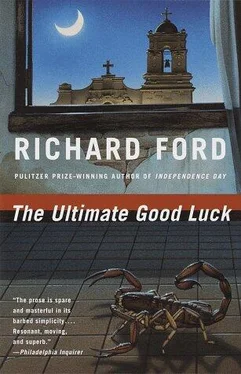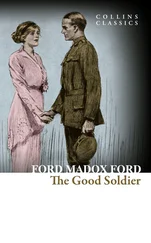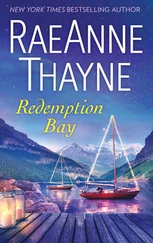“I don’t know,” Rae said. “I don’t know what you are. But God knows I wouldn’t want to violate you.” She walked out of the room.

In the spring, Rae drove up to St. Ignace and came back with two registered Airedales she said she was going to breed because she’d always wanted a dog and now seemed like a good time. She hired a mason from town to lay a concrete slab twenty yards from the trailer. She had a chain-link fence built and a wood shelter put up and moved the dogs out of the basement where she had kept them and into the cage to wait for the female to come into heat while she read books about it.
In September, the female hadn’t come in, and Rae began sleeping late and driving nights up to Petoskey taking any kind of J.C. classes she could get. In October, he caught his first two months working days, but Rae wouldn’t come back from Petoskey sometimes until after two. The dogs would wake him up barking, and he could see the lights go on out in the enclosure, hear the gates clank, and hear her talking to the dogs in a sweet, coaxing voice. He would lie in the bed and sing a song, trying to stay awake until she came in, feeling like he missed her but that she was a long distance away, almost out of reach, so that when she came inside from the dogs he would always be asleep.
In late November, he went back working nights, and Rae began staying over in Petoskey, driving up on Tuesday and coming back Wednesday night, staying, she said, with a woman she met in her economic history class. They had stopped making love in the summer, after she got the dogs, and he had begun to feel as far back as then like he was running a skein out, but that he could stand it. He thought, sitting out in the frozen night in the Scout, drinking coffee and whisky out of a hot-flask and watching the empty ice huts speckling the bay in the winter moonlight, that the only dangerous lie to being in love was that it was permanent. And once you knew that, love didn’t make you miserable, and you were safe from falling off too deep. In the best world it was a losing proposition, but even that could be satisfactory if you didn’t insist on making up the loss, since you could erase yourself by mistake in the process. And he wanted to avoid that. He knew love’s limits, and that was the key to everything.
On the sixth of December he drove into the yard before 5:00 A.M., when it was still dark in the orchard. The light was left on in the kitchen and in the dog cages, and the car was gone. In the kitchen there was a note taped to the window above the sink. It said: “Dear Warden, Just too dark in your woods. Love, R.” He took the paper off the window and put it on the sink top and read it again. He had on his green state-issue parka with the silver badge, and shining out of the glassy darkness of the window, he thought he looked good enough and up to things, even though he felt just at that precise moment like a man falling, all out of attitude and disposition, from somewhere he didn’t remember toward someplace he couldn’t see. He walked back outside and across the frozen yard to the kennels. Both pens were empty and the spotlight over the gate was left on to warm the air. He looked inside the shelter but the dogs weren’t there. The concrete had been scrubbed and ice had formed in the depressions, and the dog smell had gone thin in the cold. He walked back inside and went into every room in the trailer, turning on lights and opening closets. He turned on the radio in the kitchen to get the weather. He had the idea he should go in the basement and check the pipes and the water heater in case it snapped off cold. But when he got down the stairs where it was still and moist he turned on the bulb and looked at the water heater white and shining in the corner as if it were alive, and something seemed odd to him about it, something obstinate and repelling. He went back out to the Scout, opened down the gate, got the AR-16 out of the case, and went back to the basement and down the steps. He stopped at the bottom riser and chambered the first round, put his arm through the sling, flattened his back against the wall, found the water heater in the irons, and opened up on it like a range dummy, hitting it all over, blowing the fixtures off the top, blowing the brass medallion out and back inside the tank, and blowing the heater all the way off its base into the soft cement wall behind it. When he finished he turned off the light, put the gun back in the Scout, went inside, and ate some toast and stood watching the light grey up. When he’d washed the dish, he went back down and turned off the gas and the water in the basement, came back and took off his shirt, pulled out the phone, did sixty pushups, and got in bed.
And he thought, lying there in his pants, what was his father’s favorite thought, that every move was a necessary move, an emblem of something that needed to be fixed or set right in the everyday scheme of things, like a hand needing to come off, and what Rae had done was try to spark her luck the best she could by making a move. He didn’t blame her for it, and even though it left him feeling for that moment like he was alone and falling someplace he couldn’t see, like a dream in the dark, it didn’t make him unhappy as an idea. The best thing you could do was to take events one at a time, in order, and hope one event by itself wouldn’t cut you up too bad.
At eleven o’clock he woke up with the radio blasting Johnny Paycheck all over the trailer. He put on his parka, got the dead-dog crate out of the Scout, and brought it inside and shoveled the pieces of the water heater in it. He made coffee and stood in the living room with the door open, in the cold foggy light, listening to the furnace loading up and clicking, trying to keep the trailer warm, the flies buzzing at the windows, then took the crate out beyond the kennels into the snow and weed stubble and dumped it. Fog was expanding off the snow and clouding up into the alders at the top of the orchard. He took the box back to the Scout, shut the kennel gate, went inside and changed his uniform, and drove in to Eastport the way he dreamed he would when he had been asleep.
QUINN WANTED THE MONEY put away fast. Money gave him nerves. It was too important to fuck with. He got down on the bathroom floor and cut the grouting with his clasp knife. He took out six tiles and scooped a cavity in the dirt and laid in the four bundles of hundreds taped in sandwich bags. He raked the dirt back to level, packed it with his shoe heel, reset the tiles, and grouted them with Ipana he had bought in the Centro. He got up and turned the shower out onto the floor and let the water drain. He checked the tiles behind the toilet grail where he had the pistol. The paste there was moist and the tiles gave easily but not too easily that the moza would disturb them. The tiles were his own idea. He liked them.
Rae was sitting on the bed, her hands in her lap, the empty Varig bag on the floor. She looked confused and stoned. The room was dim and smelled like DDT. The moza had come and made the bed, but he hadn’t noticed it until now. It was stupid to miss things. He was dropping habits.
“What have you got behind the toilet?” Rae said, without moving, her hands in her lap.
He wiped his hands on his pants. “Ordnance.”
“Always a tough guy, right?”
“Eagle Scout. We always lead the survivors out,” he said. He leaned on the doorjamb and squeezed dirt off his fingers. “It keeps me straight.”
Light was failing except for a square, gold panel of sunshine on the floor in the living room. It made the bungalow appealing.
“You don’t have any vices, do you, Harry?” She gazed at him as if she wasn’t interested in the answer. “I thought you got cocaine from Colombia, not Mexico. Baranquilla. Isn’t that right?”
Читать дальше








![Theresa Cheung - The Dream Dictionary from A to Z [Revised edition] - The Ultimate A–Z to Interpret the Secrets of Your Dreams](/books/692092/theresa-cheung-the-dream-dictionary-from-a-to-z-r-thumb.webp)




